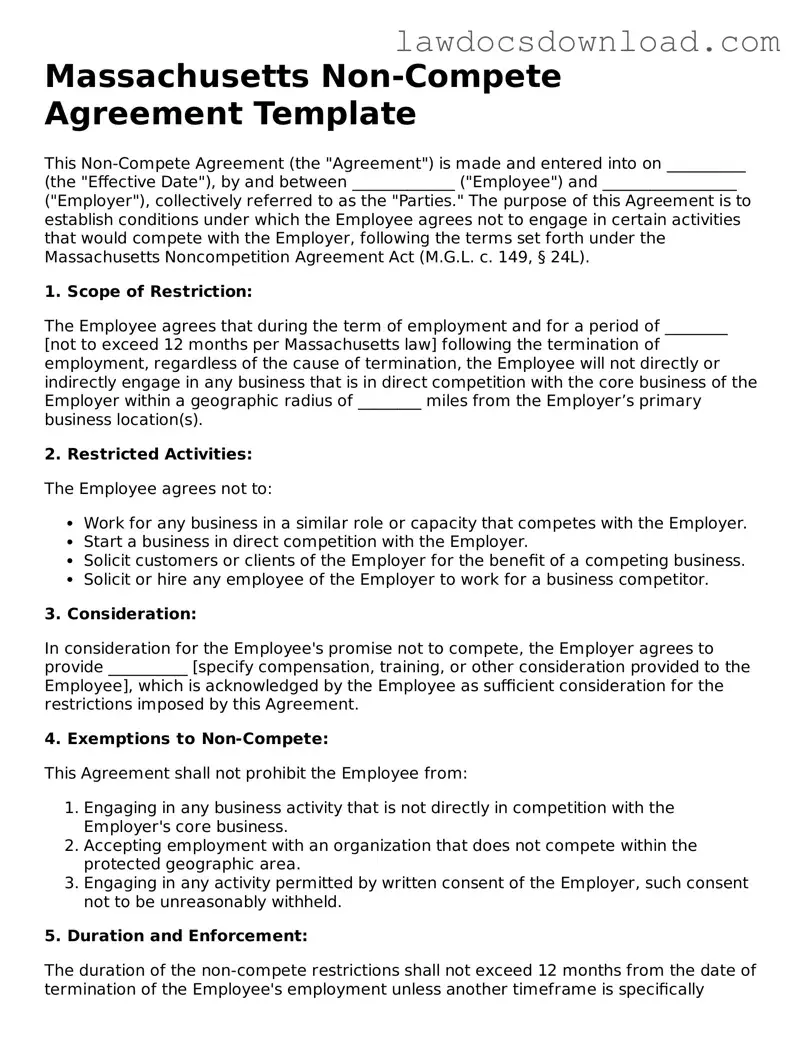Massachusetts Non-Compete Agreement Template
This Non-Compete Agreement (the "Agreement") is made and entered into on __________ (the "Effective Date"), by and between _____________ ("Employee") and _________________ ("Employer"), collectively referred to as the "Parties." The purpose of this Agreement is to establish conditions under which the Employee agrees not to engage in certain activities that would compete with the Employer, following the terms set forth under the Massachusetts Noncompetition Agreement Act (M.G.L. c. 149, § 24L).
1. Scope of Restriction:
The Employee agrees that during the term of employment and for a period of ________ [not to exceed 12 months per Massachusetts law] following the termination of employment, regardless of the cause of termination, the Employee will not directly or indirectly engage in any business that is in direct competition with the core business of the Employer within a geographic radius of ________ miles from the Employer’s primary business location(s).
2. Restricted Activities:
The Employee agrees not to:
- Work for any business in a similar role or capacity that competes with the Employer.
- Start a business in direct competition with the Employer.
- Solicit customers or clients of the Employer for the benefit of a competing business.
- Solicit or hire any employee of the Employer to work for a business competitor.
3. Consideration:
In consideration for the Employee's promise not to compete, the Employer agrees to provide __________ [specify compensation, training, or other consideration provided to the Employee], which is acknowledged by the Employee as sufficient consideration for the restrictions imposed by this Agreement.
4. Exemptions to Non-Compete:
This Agreement shall not prohibit the Employee from:
- Engaging in any business activity that is not directly in competition with the Employer's core business.
- Accepting employment with an organization that does not compete within the protected geographic area.
- Engaging in any activity permitted by written consent of the Employer, such consent not to be unreasonably withheld.
5. Duration and Enforcement:
The duration of the non-compete restrictions shall not exceed 12 months from the date of termination of the Employee's employment unless another timeframe is specifically agreed upon in this Agreement. Should any provision of this Agreement be deemed unenforceable by a court of competent jurisdiction, the Parties agree that the court shall have the authority to amend such provisions to make it enforceable, while maintaining the original intent of the Parties to the fullest extent permissible under the law.
6. Governing Law:
This Agreement shall be governed by and construed in accordance with the laws of the Commonwealth of Massachusetts without regard to its conflict of laws principles.
IN WITNESS WHEREOF, the Parties have executed this Agreement as of the Effective Date.
_______________________
Employee Signature
_______________________
Employer Signature

